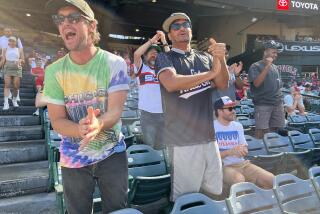Players say Red Sox get advantage
BOSTON — It was not that Brian Fuentes criticized the umpires. He didn’t get that called third strike, the Angels lost, and he aired out his frustrations after the game. Nothing unusual about that.
It was the way Fuentes criticized the umpires. He spoke in a calm and measured voice, yet he leveled a sensational charge: In Fenway Park, umpires can be too intimidated to make a crucial call against the home team.
“They seem a little timid,” Fuentes said after a wrenching defeat here last month. “It just seems like that’s the way it is here, time and time again. . . . It’s either a mistake, or they’re scared. It’s one of the two. Maybe it’s a coincidence. Maybe not.”
This was all matter-of-fact stuff, the way Fuentes presented it. He said this was common knowledge among players around the major leagues.
So we decided to check it out.
We asked two veterans, both respected as straight shooters, neither with the Angels, each with multiple appearances in the All-Star game.
We promised anonymity -- the players are active, after all -- in exchange for an honest answer to this question: Was Fuentes simply frustrated, or was he right on?
Two votes for right on.
If you’re hitting against the Red Sox, said one of the veterans, the strike zone expands in the late innings. If you’re pitching to the Red Sox, the strike zone shrinks.
“You can’t throw them strikes in the eighth or ninth innings,” the other veteran said.
The last thing Bud Selig needs on his postseason hands is another umpire controversy, after CB Bucknor appeared to blow three ultimately inconsequential calls in Game 1 of the Angels-Red Sox series, after Phil Cuzzi cost the Minnesota Twins dearly by waving off a fair ball as foul in Game 2 of their series against the New York Yankees.
But here we are, as the Angels return today to what they believe was the scene of the crime.
Not even a month has passed since that fateful ninth inning, when the Angels cried foul after Rick Reed called ball three and ball four to Nick Green, on pitches they believed should have been called as strike three, and game over.
“What was the count at the end?” Angels Manager Mike Scioscia barked after the game. “Three-and-four to Green?”
The Angels were well aware by then that they figured to draw the Red Sox in the first round, and one of the veterans we spoke with applauded Scioscia for putting the umpires on public notice in advance of this October trip to Fenway.
This is a common tactic in the NBA. Phil Jackson rails on the referees all the time in the NBA playoffs, and conventional wisdom says the Lakers might just get a call or two out of it.
Scioscia, however, denied that he had any such motive behind his unusually public protest.
“I don’t see that,” Scioscia said. “It was a good crew. They just missed some calls that were really critical. We really feel you have to be good enough to absorb a bad break, whether it’s a bloop hit or a call you feel you should have gotten from an umpire.”
After Green walked, Alex Gonzalez singled, and the Red Sox walked off in victory.
The Angels walked off in anger, with enough of a verbal ruckus that Scioscia and three of his coaches -- Mike Butcher, Mickey Hatcher and Ron Roenicke -- were fined by the commissioner’s office. (The fines were confirmed by a baseball official on condition of anonymity, since they were not publicly announced.)
We wondered whether any evidence might exist to support the notion put forth by Fuentes and seconded by our two All-Stars, that the Red Sox tend to get the benefit of the doubt on a close call late in the game.
“It’s a time-honored myth,” said Mike Port, the MLB vice president in charge of umpires. “A perception can be long held and certainly believed, but that doesn’t make it a fact.”
Port said data available from camera systems installed in every ballpark would reveal if the umpires altered their strike zone in Fenway Park, or anywhere else.
“They work a lot of places,” Port said. “They work at Yankee Stadium. They work at Angel Stadium. They work at Dodger Stadium. They just work a lot of games.
“Beyond that, people can talk about what they want to talk about.”
Selig had better hope they’re talking about something else today.
--
More to Read
Go beyond the scoreboard
Get the latest on L.A.'s teams in the daily Sports Report newsletter.
You may occasionally receive promotional content from the Los Angeles Times.







